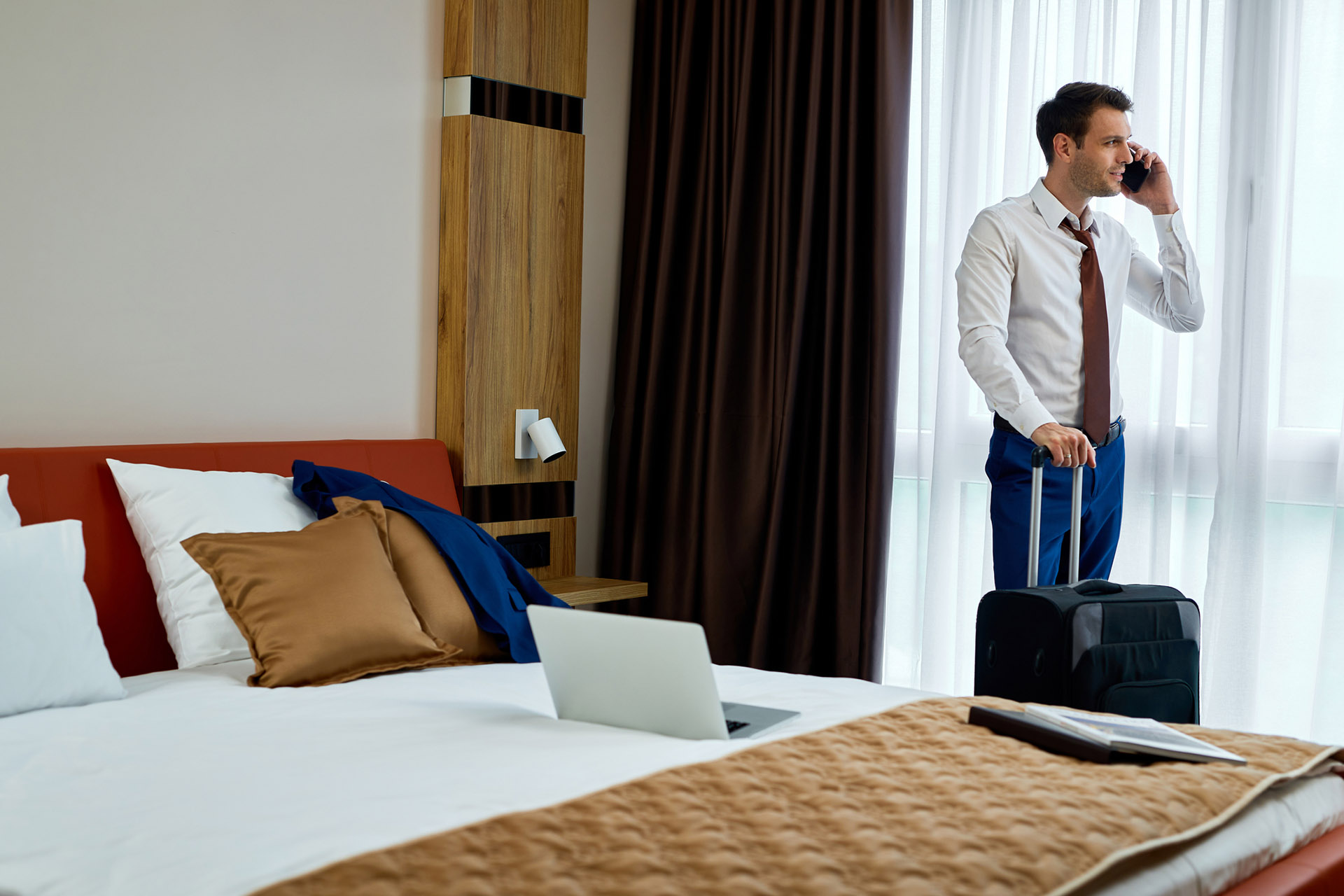
Five reasons why booking your hotel at the same time as your flight is always a good idea.
If you’re arranging a business trip which requires you to book a flight and stay overnight here are five reasons why it’s always a good idea to book your hotel at the same time. It’s what Travel Management Companies (TMCs) call hotel attachment… and it has nothing to do with how you emotionally feel about the property.
When arranging business travel, booking a hotel at the same time as booking a flight is important for several reasons. Of course, ‘hotel attachment’ represents a revenue generating opportunity for TMCs, but the benefits for the traveller and their business are far greater.
#1
Convenience
By booking a hotel and flight at the same time, you can save time and avoid the hassle of searching for a hotel separately. This can be especially helpful when traveling to a new city or country, where you may not be familiar with the area or the hotels available. The Travel Consultant will be able to advise on the most suitable hotels for your trip, being able to search and offer suggestions based on location (ie: close to your meeting point or office), price (to ensure the booking stays within travel policy parameters) or requirements (eg: if you need specific features such as business centre services, entertainment or meeting venue facilities).
#2
Cost Savings
TMCs can save you money on multiple levels. Adding a hotel reservation and additional trip requirements, such as car hire, lounge access and even rail transfers to the same booking as a flight, all at the same time, results in even greater efficiencies. Of course, bundling a hotel with a flight booking also means you’re able to enjoy the TMC’s exclusive corporate rates and trade discounts, meaning you’ll always get a better deal by booking a flight and hotel together with your TMC than by doing it yourself at a later date. And, again, your TMC will ensure only hotels that are within your travel policy are available to book.
Here at Gray Dawes, we can secure package rates from suppliers such Expedia, where putting flights with the hotel booking can save up to 15% on the cost of accommodation.
#3
Availability
By booking a hotel at the same time as booking a flight, you can ensure that you have a place to stay when you arrive at your destination. This may sound a little obvious, but it’s particularly important if you are traveling during peak travel times or to a popular destination where hotel rooms can be in high demand. For example, anyone involved in the fashion industry will tell you that getting to New York for the show isn’t the problem but finding a hotel room, unless you’ve booked well in advance, is a different story. So, don’t delay in securing a hotel; book it at the same time as your flight.
#4
Streamlined Expense Reporting
Booking your hotel and flight together can make it a lot easier to manage your expenses for your business trip. It can be difficult to keep track of separate receipts and invoices for flights and hotels, but booking them together can simplify the process and make expense reporting easier. And if you’re working to a specific budget, your TMC can ensure this is all covered in a single transaction.
Of course, attaching a hotel to a flight booking doesn’t just benefit expense reporting, but also data management of your entire corporate travel programme. If hotel bookings go rogue, you can’t manage what you can’t measure!
#5
Duty of Care
Accommodation is a vital part of managing travel risk, to the point that the hotel industry was deeply involved in the creation of “ISO 31030 – Risk Travel Management: Guidance for Organisations” – the new travel risk management standard. The guiding principle of ISO 31030 is that a Travel Risk Assessment is fundamental to comply with obligations of Duty of Care. Check out our blog on ISO 31030 to find out more.
The ISO 31030 means international businesses go from a lack of understanding and unpreparedness for risk situations to having a well-thought-out critical travel risk management strategy. The hotel industry was the expert travel industry group, outlining issues of hygiene, fire safety, and general travel safety. The hotel industry helps to ensure that accommodation is fit for business purposes, meaning they are constantly aware of risk avoidance, reduction, and risk-sharing.
Beyond this, of course, is that organisations have a fundamental corporate social responsibility to know where their staff are when travelling for business. By booking the hotel and flight together, a TMC can record, track and monitor the status of the traveller and their location seamlessly. So if an emergency happens – and even if it doesn’t – you can rest assured that your travellers stay safe.
#6
Policy Compliance
So, there are the five compelling reasons why it’s always best practice to attach a hotel booking to a flight reservation which requires an overnight stay. But, always keen to over deliver, we actually have a sixth reason which we’ve tried to incorporate in all the above, but it is work a shout out in its own right. And that is Policy Compliance.
By booking the hotel at the same time as the flight, you’ll be sure that your TMC will only offer you the right properties which are included in your organisations travel policy – that means you’ll stay in budget with agreed corporate rates and maybe also earn reward points as part of a preferred hotel deal that’s already been set up. If the hotel is booked at a later date, or left to the traveller to arrange, these benefits (and compliance) can easily be lost.
Overall, booking a hotel at the same time as booking a flight for business travel can save time, money, and simplify the whole expense reporting process. It is a good practice for any business traveller who wants to make their trip as smooth and stress-free as possible.
So remember… if you’re booking a flight and staying overnight, also book your hotel and make the trip right!
Visit our dedicated hotel page for more information about Gray Dawes Travel’s hotel booking services or contact one of the team to chat about your own requirements.
Related Articles
Artificial Intelligence in Business Travel
From intuitive chatbots to predictive analytics, AI offers businesses significant efficiencies and raises important questions around data privacy, ethics, and sustainability. At Gray Dawes Travel, we’re embracing AI, but understand that it needs to be done responsibly. In this article, we explore the negative impact of AI, how we, as an organisation, can mitigate these impacts, and look to the future of the technology and how it might enhance travel.
How to Pack Like a Business Travel Pro
After a long journey, there’s nothing more frustrating than needing one item from your suitcase, only to discover it buried beneath everything else. Business travel is full of tight schedules, back-to-back meetings, and unfamiliar cities to navigate, so ensuring that...
Travel Talks – 2025 Trends & Predictions
Join our MD of Europe, Dave Bishop, and Group Marketing Director, John Cooper, as they discuss what will influence corporate travel management in 2025. Dave and John also offer a few tips on how to elevate your business travel experience in the year ahead.




